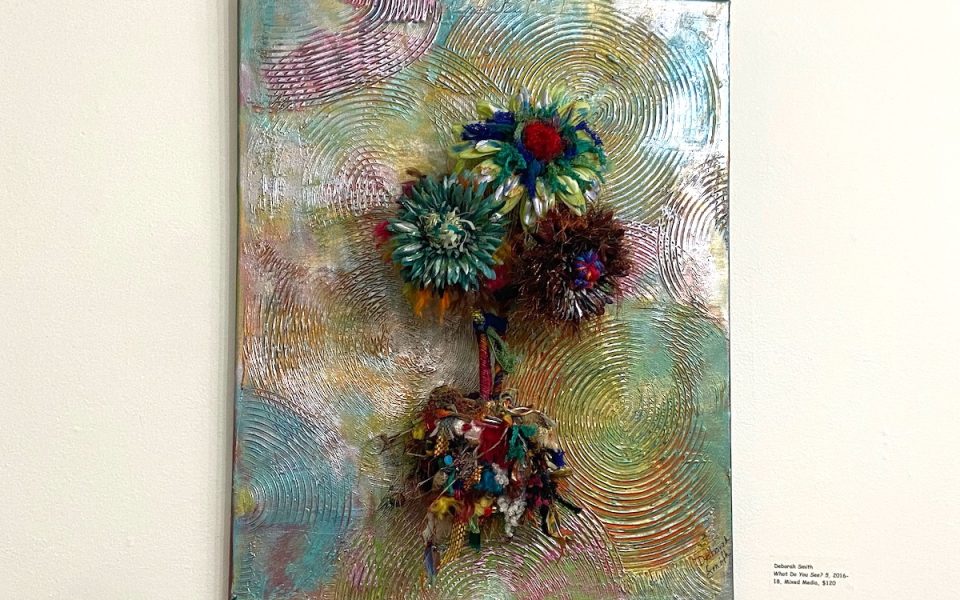Photo: “What Do You See?” by Deborah Smith (photo by Rachel Spinella)
A rectangular canvas
hangs against the pasty white wall of the Delta Arts Center in Winston-Salem
and draws the eye in. Colors of blue, green, pink and purple splay across the plane,
like a sunset reflecting off of the water. Protruding from the canvas is a
three-dimensional multicolored bouquet of flower that creates small ripples
that expand outwards to the edges of the piece.
The piece, titled “What
Do You See?,” is exhibited as part of the art center’s “Invitational 2020”
event on Jan. 30 which featured the works of African-American artists from
across the state.
Deborah Smith, the
creator of the piece, said she became a part of the art world when she couldn’t
find any décor that she liked while decorating her home.
“When I was building my
home, I was looking for a raw or industrial look,” she said. “I was looking for
some art. I made my placemats and curtains; I said I would like something else
with this besides cushions. I wanted roses and I had fabric, and old pictures. I
took it out and placed the fabric behind it to see. Everyone that came into my
kitchen kept asking where I got it and that’s how it all started.”
Her mixed-medium works
often use real flowers atop abstract, painted backgrounds. All of her pieces
are titled the same.
“I name all my art as,
‘What do you see?’” she said. “because what I see may be a little bit different
then someone else may see. People have asked me before: ‘What is it?’ And I say,
‘You tell me what you see.’ If I label it then that means, that it’s what I
see.”
On a nearby wall hangs a
painting exploding with variations of different colors: blues, yellows, purples
and pinks. The hues swirl around a center of dark, silhouetted figures. Musicians
emerge from the darkness, playing a variety of instruments — a concert in the shadow
realm.

In front of her mural, in
a wheelchair, sits Monique Johnson, a young artist and disability rights
advocate.
“My entry into art came
from a need,” she said. “I was trying to raise funds to attend college. I
always knew that I had the artistic ability to make something beautiful.
“When people see me — if
you don’t know me — initially, you’ll size me up and try to figure out what I
can and can’t do,” continued Johnson who is two-feet tall. “In this society, we
live off of preconceived notions, that are often false. I realized that when
people look at me, they may look at my life as a disadvantage. But when I am
able to show them my art, what art has done in my life and more importantly
what my story has done for others, then their perception of me changes. People
come to realize that if I can do it, then they can do it.”
On the other side of the room, artist
Colleen Cannon-Karlos, whose square glasses peek out from underneath her black
hair, sits at a round table and snacks on some hors de ’oeuvres.
Behind her hangs two framed pieces
of cardboard that Cannon-Karlos manipulated into a texture that looks similar
to a washboard — presenting two different symbols.
One is the ancient Egyptian symbol
known as the Ankh, which means “life.”
“So, the one all the way on the left
is an artifact from the Ashanti people in Africa,” she said. “It is a symbol
for emancipation. I like my imagery to be moving and evolving so that they can
see the form and see that it is in-formation.”
Like Cannon-Karlos’s pieces, the
show at Delta Arts makes space for African-American art to be seen and
celebrated.
Delta Arts curator
Alison Fleming noted the importance of providing a space to exhibit different
artists’ work. She mentioned a conversation she had with Smith, who ended up
being the first artist of the evening to sell a piece.
“I said that you are a
self-taught artist, and you may not really think of yourself as someone who
exhibits widely in a professional sense,” Fleming said. “But you’ve created
things that speak to people.”
Smith noted her
appreciation for the exhibit and her excitement at the increased visibility
she’s gotten as an artist.
“I think that’s a good thing because we have so many creative people that don’t even know about places like this,” Smith said. “It’s good for our culture to see. Like in here, there are so many different people on different levels. And it’s who they are and representing who they are. That there are no limitations for what I can do. And it opens a lot of doors to your mind.”
Invitational 2020 at the Delta Arts Center runs until May 30. Find out more at deltaartscenter.org.
Join the First Amendment Society, a membership that goes directly to funding TCB‘s newsroom.
We believe that reporting can save the world.
The TCB First Amendment Society recognizes the vital role of a free, unfettered press with a bundling of local experiences designed to build community, and unique engagements with our newsroom that will help you understand, and shape, local journalism’s critical role in uplifting the people in our cities.
All revenue goes directly into the newsroom as reporters’ salaries and freelance commissions.


Leave a Reply